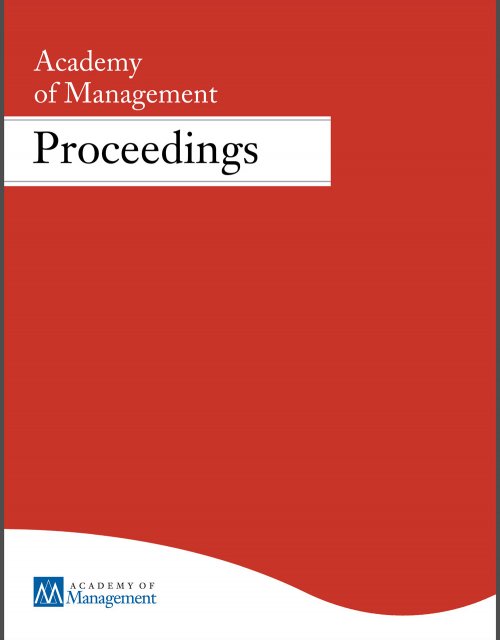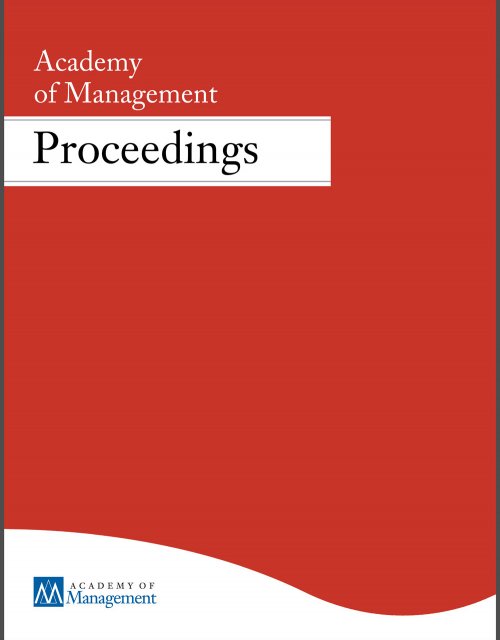Publication records
Subject(s)
Human resources management/organizational behavior; Strategy and general management; Technology, R&D management
Keyword(s)
innovation, HR, inventor mobility, alliance formation
While losing a valuable employee to competition shouldn't be celebrated, it does provide an opportunity for innovation and collaboration
© copyright Mark Allen Group 2019
Keyword(s)
Digital strategy, government, digital law, digital infrastrucure
Today’s digital strategy of governments worldwide is failing. The result is a weakening of government functions in the digital sphere – with risks for democracy and freedom. Digital innovation on a society-wide scale will only be effective if governments adopt stronger digital strategies. Key issues are a principle-oriented, less-specific digital regulation, bigger government’s spendings for digital infrastructures, a greater autonomy of state and local governments, and the establishment of a ‚Ministry for Digital Affairs“.
Subject(s)
Information technology and systems; Technology, R&D management
Keyword(s)
Digital strategy, government reform, digital law, digital infrastrucure
Digital innovation can be extremely beneficial to citizens. However, current digital strategies of governments are not strong enough to ensure that digital innovation is not a threat to society – but, only a benefit. Digital innovation will only be effective if governments adopt strong digital strategies. Key issues are a less-specific digital regulation, a greater government’s investment in digital infrastructures, a higher flexibility for local governments, and a strengthening of digital policy leadership within governments.
Keyword(s)
international human rights, right to vote, voter fraud, disinformation, authoritarianism
Subject(s)
Information technology and systems; Technology, R&D management
Keyword(s)
China, privacy, cybersecurity, transatlantic relationship
China, Europe, and the United States are competing over whose image will be most reflected in rules and normst hat define digital markets. Regulatory measures such as Europe’s GDPR and China’s Cybersecurity Law combine privacy, security, and safety regulation. Driving factors are security policy as well as industry and trade policy. With China pulling into the pole position in the digital technology race, it is time for the United States and Europe to forge a digital governance alliance
Subject(s)
Information technology and systems; Technology, R&D management
Keyword(s)
Competition law, antitrust law, digital platforms, data access
The Commission “‘Competition Law 4.0’” was set up by the German Federal Minister for Economic Affairs and Energy with the task to draw up recommendations for the further development of EU competition law in the light of the digital economy. The final report with 22 recommendations was handed over in September 2019.
The commission finds that the practical and actual power of consumers to dispose of their own data must be improved, clear rules of conduct for dominant platforms must be introduced, legal certainty for cooperation in the digital sector must be enhanced, and the institutional linkage between competition law and other digital regulation must be strengthened.
The commission finds that the practical and actual power of consumers to dispose of their own data must be improved, clear rules of conduct for dominant platforms must be introduced, legal certainty for cooperation in the digital sector must be enhanced, and the institutional linkage between competition law and other digital regulation must be strengthened.
Pages
88
Subject(s)
Technology, R&D management
Keyword(s)
Artificial intelligence, machine learning, inequality, algorithm biases, discriminations
Herbert Simon predicted in 1958 that the revolution in computers will force humans to consider our role in a world in which our intellectual power and speed are outstripped by the intelligence of machines. The purpose of this panel symposium is to invite thought leaders in the field of management to share how they consider the role of organizations in a world in which the predictions Simon made are about to be fully realized. In particular, we will focus on how organizations and their members adapt to artificial intelligence (AI) and how organizations learn from machines that are also learning from the (potentially biased) data the organizations generate.
With permission of the Academy of Management
Volume
2019
ISSN (Online)
2151-6561
ISSN (Print)
0065-0668
Subject(s)
Human resources management/organizational behavior
Keyword(s)
Error management
Recent research suggests that the management of organizational errors is increasingly a responsibility for top executives. The rise of democratizing technologies, such as peer-to-peer social media, appears to intensify the speed and consequences of these errors by challenging organizations’ relationships with key stakeholders. Engaging in the active management of unfolding organizational errors before they evolve into crises becomes a strategic concern in itself that challenges classic approaches. However, this new role for CEOs, board chairs and directors has received relatively limited attention in academic research: most recent literature focuses on learning after errors and failure not managing errors that is, engaging in actions to minimize negative and maximize positive outcomes of the errors as they occur. The limited attention may be due to the fact that research is done by different scholarly communities, from strategy to organizational behavior and specific streams that exchange too little between them. It is the purpose of this panel to explore the preferred research avenues going forward, all the while capitalizing on what we already know and what we need to know (and how) (i) with regard to organizational errors or errors in organizations (ii) in particular how errors are and can be managed from the top of the organization i.e. at the executive level and (iii) as distinct from error prevention (risk management, compliance, etc.), damage control (crisis management) and learning from errors (and failures). Key questions should revolve around: What is the role of senior executives in detecting and managing errors, so as to avoid them actually turning into disasters or failure? What is required from top executives for effectively doing so – for example what forms of leadership make executive error management more effective? What is the impact of executive error management on strategy – for example how does it affect the dynamic capabilities of the organization, or even bring about a new understanding of strategy as learning? We are gathering a panel of highly experienced scholars representing several of the major research streams with the aim of fostering a rich trans-disciplinary discussion. We plan to reserve ample room for dialogue with the audience, of which practitioners and consultants should form a significant part.
With permission of the Academy of Management
Volume
2019
ISSN (Online)
2151-6561
ISSN (Print)
0065-0668
Keyword(s)
Organizational learning, successes, failures, performances, leadership
Organizations learn from direct experience and the experience of others, and code these experiences as successes or failures by comparing against certain reference point. Although the growing literature on learning from success and failure has made meaningful headway in exploring these differences, our understanding of the processes through which learning through experience with failure and success is still quite limited. This symposium brings together a series of papers dealing with cutting-edge issues related to organizational learning from success and failure. Individually as well as collectively, these papers address fundamental, central, and unresolved questions regarding how organizations learn through successes and failures, why differences arise across these forms of learning, and what outcomes can be expected from related learning processes.
With permission of the Academy of Management
Volume
2019
ISSN (Online)
2151-6561
ISSN (Print)
0065-0668
Subject(s)
Health and environment; Technology, R&D management
An increasing number of research projects successfully involve the general public (the crowd) in tasks such as collecting observational data or classifying images to answer scientists’ research questions. Although such crowd science projects have generated great hopes among scientists and policy makers, it is not clear whether the crowd can also meaningfully contribute to other stages of the research process, in particular the identification of research questions that should be studied. We first develop a conceptual framework that ties different aspects of “good” research questions to different types of knowledge. We then discuss potential strengths and weaknesses of the crowd compared to professional scientists in developing research questions, while also considering important heterogeneity among crowd members. Data from a series of online and field experiments has been gathered and is currently analyzed to test individual- and crowd-level hypotheses focusing on the underlying mechanisms that influence a crowd’s performance in generating research questions. Our results aim for advancing the literatures on crowd and citizen science as well as the broader literature on crowdsourcing and the organization of open and distributed knowledge production. Our findings have important implications for scientists and policy makers.
With permission of the Academy of Management
Volume
2019
ISSN (Online)
2151-6561
ISSN (Print)
0065-0668

